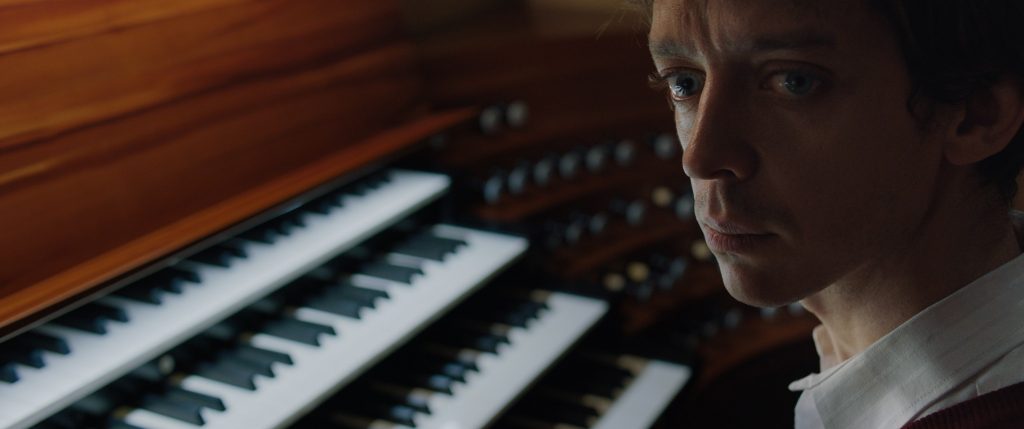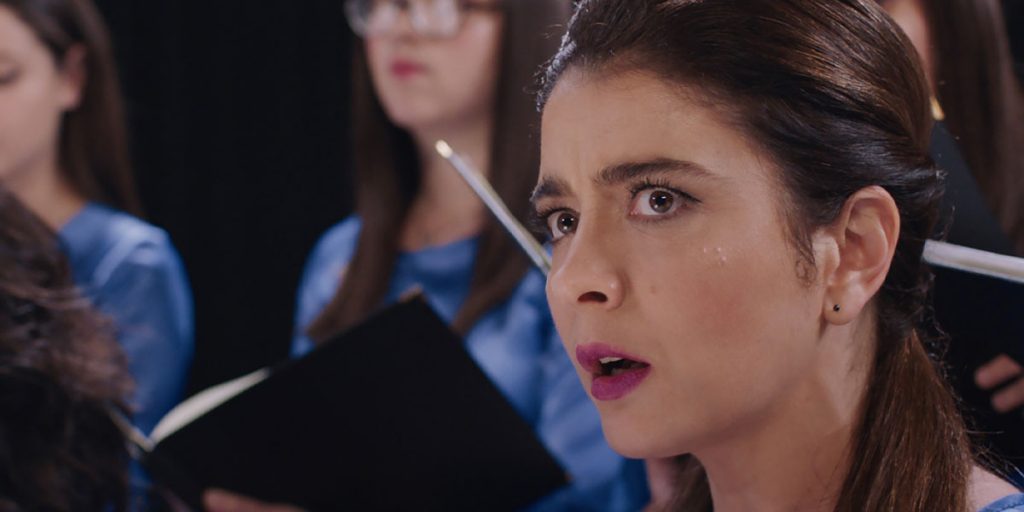The Intruder spins a beguiling web of nightmarish terror with captivating cinematic energy but denies us the pleasure of witnessing and understanding its strangest mysteries.
“There’s an intruder,” Adela (Mirta Busnelli) tells our protagonist Inés (Érica Rivas), as she tries to uncover why a microphone in the recording studio where they work is picking up mysterious sounds that can’t easily be detected. “You have nightmares? Intense dreams?” Adela asks, and Inés nods. “That’s how they enter…They turn up in dreams and they cross over…First you hear them, right? Then you see them. They come closer, they surround you and suddenly, they take hold of you…”
Bodily invasion, nightmares merging into reality, and hallucinatory paranoia are the name of the game in The Intruder (El Prófugo), a psychosexual horror thriller from Argentinian writer and director Natalia Meta. The film introduces us to Inés, a voice actress and singer recovering from a traumatic event that took place on a recent vacation with her new boyfriend Leopoldo (Daniel Hendler). Months after the event, she begins experiencing nightmares and lifelike hallucinations, questioning her own perception of reality. While at a choir rehearsal, she has trouble with singing her soprano part and, while recording dialogue for an upcoming film, low, growling noises are picked up on the microphone. A doctor’s examination hasn’t found anything wrong with her, but she suspects something else, something more sinister is interfering with her voice work, and perhaps some sinister, invisible force inside her own body. Meanwhile, two new faces enter her life: her mother (Cecilia Roth) who has unexpectedly come to stay with her, and Alberto (Nahuel Pérez Biscayart), a new organist at the concert hall where her ensemble performs. As her nightmares and paranoia begin to overlap into reality, Inés is led down a strange path of psychological and bodily terror and perhaps even self-discovery and empowerment.
While only her second feature film, Meta showcases impressive cinematic chops with a brilliant eye and ear for visual and musical flair. A chilling opening perfectly sets the eerie mood of the film with a tense BDSM scene framed in a cold hue of blue, our ears stimulated by glassy musical tones and sensual, breathy moans, as the camera cuts to a shocked face with hands covering a nervous mouth as Inés records the dialogue and sound effects. A later scene with another film within the film features a Japanese horror flick, this time the screen ignited with an intense, vibrant red. Meanwhile, cinematographer Bárbara Álvarez exerts smooth control over the camera, injecting visual grace to a film otherwise steeped in a jagged sense of reality and psychological tension. Most striking is an overhead tracking shot above a hotel pool after a terrifying event has occurred, the camera moving with ethereal unease across a worldly plane.

Meta also demonstrates a clever eye for set design, especially seen in the concert hall where several pivotal scenes take place, the wooden corridors striking in their acoustic-shaped architecture that resembles the interior of a stringed instrument. Meta’s imaginative vision also appears in the film’s unique sound design, such as a scene where an organ erupts with an avant-garde, otherworldly melody courtesy of composer Luciano Azzigotti, an arresting moment steeped in gothic intrigue. Also memorable is a closing choral performance of Los Auténticos Decadentes’ song “Amor”, with an accompanying dance sequence that bristles with a vibrant musical energy making for an undeniably captivating if unexpected scene.
Also noteworthy is an impressive cast that Meta has assembled. In the leading role, Érica Rivas invests paranoia, desperation, and quiet trauma into Inés, crafting a memorable character that draws us into the world of the film and her strange experiences. In a brief appearance, Daniel Hendler imbues Leopoldo with brash overconfidence, crafting a smug if annoying personality that’s the perfect romantic foil to an uncommitted Inés. Meanwhile, Frequent Almodóvar collaborator Cecilia Roth makes a welcome appearance as Inés’ mother Marta, both grounding her daughter’s paranoia and arousing her suspicions. Another highlight performance is Nahuel Pérez Biscayart as the organist Alberto, giving him an impish, sly, almost boyish presence in his dialogue, movements, and expressions.
While The Intruder dazzles us with its arresting visual and musical energy, the film unfortunately falls apart under its own ambiguity. The film weaves together an intriguing thematic tapestry involving dreams, paranoia, trauma, and sexuality, but never coalesces into a satisfying or even comprehensible whole. Ideas about trauma manifesting as bodily transformations and friendly faces are teased to us, but are never fully explored, leaving us more confused than frightened at times. The antagonizing terror is never properly defined, only hinted at as an “intruder,” and the few explanations we receive raise more questions than answers. These otherworldly and unknown terrors hinted at feel unnecessarily grounded, making us wish we’d been given the pleasure of seeing strange images to provoke our imagination. Ultimately, one’s enjoyment of the film hinges this ambiguity: there’s a compelling, striking cinematic vision worth being experienced here, if you’re willing to set aside the need for visceral thrills and a coherent explanation of these supernatural happenings.
The Intruder (El Prófugo) premiered at AFI Fest on October 16, 2020.

